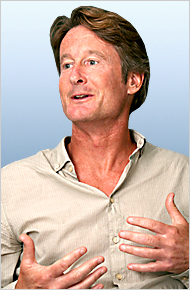Coding deliverables
Several of these assignments include this image: 
This image indicates that I want you to build the assignment and then make a video of it working. Use Expression Encoder Screen Capture and be sure to include a video of your face next to your widget.
- Redesign the Tsunami web page
- Speed up your Tsunami pages
- Prettify the Fauves
- Convert to XHTML
- Enrich your INFO 343 webpage with rich snippets
- Help the Huskies pick a date!

- Help the Huskies slide a date!

- Sort the Dawgs!

- ABC iSchool Course web services

- Grease up the iSchool web page!

- SPARQL the Huskies

- JSONP lots of Huskies!
- Is cycling on TV tomorrow?

- Extend Firefox

- Animate Bow Down to Washington
- Express-O-matic for By George

Get prepared for your interview with Kevin O'Connor
Kevin O'Connor is chief executive of FindTheBest.com a comparison search engine and a founder and former C.E.O. of DoubleClick.
Q. How do you hire? What are you looking for? What questions do you ask?
A. Hiring is the toughest. After you've done it a thousand times, and you hire someone who's bad, you still realize you don't have it all figured out.
 One of the most useful things I learned from electrical engineering was how you figure out what's in a black box. You throw something called an impulse function at it, and you can figure out what's inside the black box by what comes out of the box.
So, people are black boxes. You can ask them a question, and they'll tell you whatever they think you want to hear. So, you've got to throw an impulse function at them. I try to keep them off balance. I try to give them a question that feels like a two-by-four between the eyes.
One of the most useful things I learned from electrical engineering was how you figure out what's in a black box. You throw something called an impulse function at it, and you can figure out what's inside the black box by what comes out of the box.
So, people are black boxes. You can ask them a question, and they'll tell you whatever they think you want to hear. So, you've got to throw an impulse function at them. I try to keep them off balance. I try to give them a question that feels like a two-by-four between the eyes.
Q. Like?
A. I'll start off with, "How smart are you?" People get really uncomfortable. They don't know what to do, and they don't know how to answer it. They know it's kind of a trick, and it flusters them. Or I'll take a look at something that they did, and I'll tell them it's a big mistake and then just see how they react. Do they start crying? Do they get in a terrible rage and argue with you, or do they come back and systematically tell you why you're wrong, or perhaps agree with you on certain areas? So, I'm looking for that.
Q. What do you want to hear in terms of answers to the "smart" question?
A. Ultimately, we're looking for what I call smart athletes, people who have raw intelligence. Some of the best people I've worked with didn't go to great schools. It's not necessarily about what skills they have because the most interesting problems are the ones that nobody's ever faced before - especially in a start-up, but really any company.
And I really love competitive people. I get nervous when someone has never put themselves in a competitive situation. You go through rough patches, and I don't want people bailing at the first little bit of water coming on ship. I want people who, when the ship's almost underwater, they figure out how to save it.
Q. What's a good answer to your question about whether someone is smart?
A. I'm looking for somebody who is a genius in a certain area. You're not going to find a guy who's a genius at everything, but you want someone who's really, really good at something, and knows it. But they also realize they have shortcomings in other areas, and they say: "Look, I'm just not that smart in that area. I could be smart about it, but it just doesn't interest me. I just have no experience in it, so I'm not going to lie to you." I tell them they'd better be smart because, if they're not, they'll be fired. You can fool me that you're smart in this interview, but I'll say that you're not going to fool me three months from now. If you're smart and you're competitive, I guarantee you will love it here.
The other thing I'm looking for is passion. I'm really passionate about technology. Someone's got to want to do this job. It shouldn't be a job. You shouldn't have to work 70 hours a week. People will say, oh, you know, I understand it's a start-up; we'll work 70 hours a week. I want you doing it because that's what you would do.
Thanks to "Sit Down, Please, and Tell Me How Smart You Are" September 18, 2010, NY Times
Write down what you're smart about for me
Write a paper telling me what you're smart about, what it is, how it works, why you're smart about it, how you can demonstrate your smarts, etc.
Can't think of a new technology?
On the other hand, people are always important: